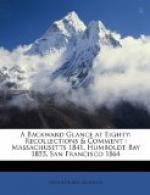The leading hotel was the International, lately opened, on Jackson Street below Montgomery. It was considered central in location, being convenient to the steamer landings, the Custom House, and the wholesale trade. Probably but one building of that period has survived. At the corner of Montgomery and California streets stood Parrott’s granite block, the stone for which was cut in China and assembled in 1852 by Chinese workmen imported for the purpose. It harbored the bank of Page, Bacon & Co., and has been continuously occupied, surviving an explosion of nitroglycerine in 1866 (when Wells, Fargo & Co. were its tenants) as well as the fire of 1906. Wilson’s Exchange was in Sansome Street near Sacramento. The American Theater was opposite. Where the Bank of California stands there was a seed store. On the northeast corner of California and Sansome streets was Bradshaw’s zinc grocery store.
The growth of the city southward had already begun. The effort to develop North Beach commercially had failed. Meiggs’ Wharf was little used; the Cobweb Saloon, near its shore end, was symbolic. Telegraph Hill and its semaphore and time-ball were features of business life. It was well worth climbing for the view, which Bayard Taylor pronounced the finest in the world.
At this time San Francisco monopolized the commerce of the coast. Everything that entered California came through the Golden Gate, and it nearly all went up the Sacramento River. It was distinctly the age of gold. Other resources were not considered. This all seemed a very insecure basis for a permanent state. That social and political conditions were threatening may be inferred when we recall that 1856 brought the Vigilance Committee. In 1857 came the Fraser River stampede. Twenty-three thousand people are said to have left the city, and real-estate values suffered severely.
In 1860 the Pony Express was established, bringing “the States,” as the East was generally designated, considerably nearer. It took but ten and a half days to St. Louis, and thirteen to New York, with postage five dollars an ounce. Steamers left on the first and fifteenth of the month, and the twenty-eighth and fourteenth were religiously observed as days for collection. No solvent man of honor failed to settle his account on “steamer day.”
The election of Lincoln, followed by the threat of war, was disquieting, and the large southern element was out of sympathy with anything like coercion. But patriotism triumphed. Early in 1861 a mass meeting was held at the corner of Montgomery and Market streets, and San Francisco pledged her loyalty.
In November, 1861, I attended the State Fair at Sacramento as correspondent for the Humboldt Times. About the only impression of San Francisco on my arrival was the disgust I felt for the proprietor of the hotel at which I stopped, when, in reply to my eager inquiry for war news, he was only able to say that he believed there had been some fighting somewhere in Virginia. This to one starving for information after a week’s abstinence was tantalizing.




